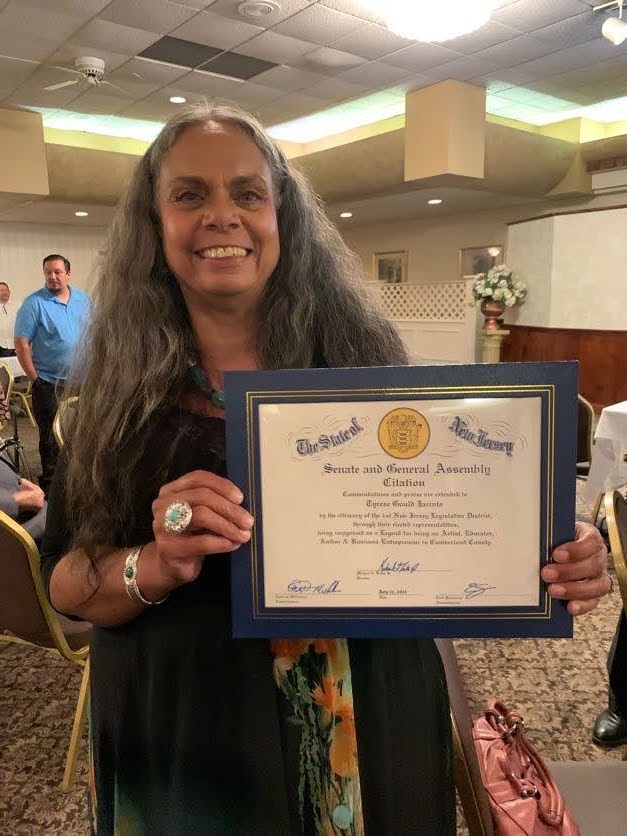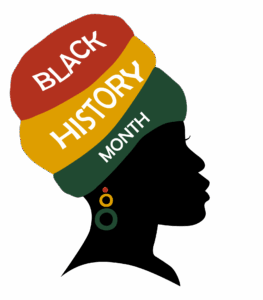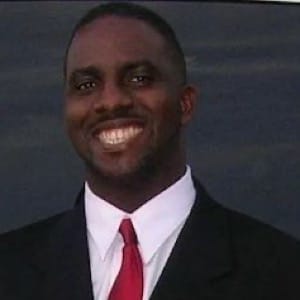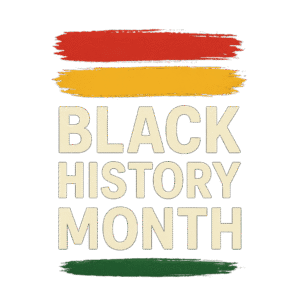Diverse Voices: Tyrese Gould Jacinto, Native Americans Invisible No More

Feature photo of Tyrese Gould Jacinto courtesy of Tyrese Gould Jacinto.
BY CLYDE HUGHES | AC JosepH Media
BRIDGETON — When she was contacted by the Cumberland County Legends Committee this summer to inform her she was being honored by the organization for her work related to Native Americans, Tyrese “Bright Flower” Gould Jacinto was convinced that they were mistaken.
While her family has been known as leaders and trailblazers in causes for Native Americans locally and around the state for decades, Jacinto had indeed established her own influential path as an artist, prominent children’s author, entrepreneur, and her own brand of activism.
Still, being called a “Cumberland County Legend,” was still initially hard for Jacinto, a member of the Nanticoke Lenni-Lenape Nation in New Jersey, to grasp.
“I told her [the Cumberland County Legends contact], ‘I think you have the wrong person. I think you mean my father, who is 80 and the chief of our tribe,” Jacinto recently told Front Runner New Jersey. “He’s really accomplished a lot. He would be a legend. That’s what I told her. And she laughed. She says, “No. We mean you.”
Her father, Chief Mark “Quiet Hawk” Gould, proudly introduced his daughter gave her intro speech at the Cumberland County Legends dinner on July 22 at Merghi’s Savoy in Vineland.

Jacinto said she saw the event as evidence of advancement for Native American culture in the area. She said her father, late mother, Phyllis “Red Deer” Gould, and others opened the door for those like her to walk through. She said because of them, Native Americans are “Invisible no longer” in the community, state and country.
“My father really put those paving stones down so that my generation wouldn’t have to be invisible,” Jacinto said. “He accomplished that. My father’s generation accomplished that part. We didn’t have to pretend to be somebody else.
“So we don’t have to be invisible. So now, all I’m doing is adding to those, that paved the road that my father, my mother and my grandparents put down for us; going from invisibility to visibility. I’m making it a little better for my children and my grandchildren. I put the stories in children’s books so when they read them, we humanize ourselves instead of what the history books have done to dehumanize us.”
Jacinto has been recognized numerous times by the New Jersey Senate and State Assembly for her 30-plus years of work with Native Americans as a business leader, notary public, licensed realtor, life insurance producer, author, artist, and owner of the Purépecha Unalachtigo Tourist Ranch.
She is also president and CEO of the Native American Advancement Corp. (NAAC), appointed member of the Department of Community Affairs’ WAP Policy Advisory Committee, the state’s Department of Environmental Protection’s Environmental Justice Advisory Council.
The Native American Advancement Corp. promotes the public awareness and participation of all residents in energy efficiency methods, thereby protecting the region’s natural resources, of air, land, and water, through its programs and workforce development in the local areas.
Jacinto said the Native American Advancement Corp. was started in 2009 and was awarded nonprofit status the following year. She started off with two computers and a desk in her home.
“It was simply to be able to hire the local Native American community,” Jacinto said. “I’m a fourth-generation general contractor. There was an opportunity for the state of New Jersey to do the weatherization assistance program.”
She said her father, who worked for years at Gateway Community Action Partnership in Bridgeton, was all for taking advantage of the opportunity. She said working under him doing his financial books gave her the motivation to create the foundation.
“I didn’t go to school for it but I knew all the construction terms and how to build houses and so forth,” Jacinto said. “So, I told him, ‘Dad, there’s this opportunity to get into the weatherization assistance program. What do you think?’ He said, ‘Let’s go.'”
She said now 95% of NAACs workers have purchased their own homes with the help of a financial literacy component of their program.
“We tell every little banking secret because that’s my background,” Jacinto said. “We tell them what not to do and we have some employees that are ready to pay off their houses. Our youngest employee was 20 when he bought his first house.
“We encourage everybody to get a side business and use their own talents and skills. We ask them, ‘What do you know how to do?’ One said they know how to do floors. ‘Get that side business.’ One guy did the floors for Eagle Manor, which is a big place. We teach them to fish instead of handing out fish.”
Jacinto has written and produced more than a dozen children’s books focused on the Native American experience in an effort to expose the greater public and well as her own community about the traditions of the culture.
She said her children and grandchildren have always been the main motivation behind writing her books.
“They are my number one fans,” Jacinto said. “When I put out a book, I’ll call my daughter and she orders it. It comes in the mail she records the grandchildren opening it.
“They get so excited when they see their picture on the back of the cover or their Nana in the pop-up, their great grandpa pop on the back of the cover or picture of us. That’s the only focus because I’ll be honest with you, you don’t get rich writing books.”
She said that special feeling of her grandchildren finding her latest book could have been extended to the reception this summer. Jacinto said she “still feels like Cinderella” months after the Cumberland County Legends reception.

After feeling nervous about speaking despite all of her experience in the public, she said she felt honored to be in front of community leaders and attendees.
She said despite the honors, she knows the sacrifices made that helped her and others reach that point. She said her parents and their supporters advanced the cause of Native Americans despite of great peril for them.
“Growing up, my parents were always rebels,” Jacinto said. “I remember we were living right outside of Washington D.C., and our families were part of the American Indian movement back in the early 70’s.
“We knew that the FBI had taps on my parent’s line, but we didn’t have anything to worry about because my mother worked out of Washington D.C. and my father was a union book carpenter.”
Jacinto said she has been proud to carry on the work started by her parents and their contemporaries to keep their culture alive and make sure they are invisible no more.
Follow Us Today On:
Subscribe to FRNJ EXTRA premium content newsletter for exclusive information on this event and other premium content, courtesy of Front Runner New Jersey!
Note from AC JosepH Media: If you like this story and others posted on Front Runner New Jersey.com, lend us a hand so we can keep producing articles like these for New Jersey and the world to see. Click on SUPPORT FRNJ and make a contribution that will do directly in making more stories like this available. Thank you for reading!










